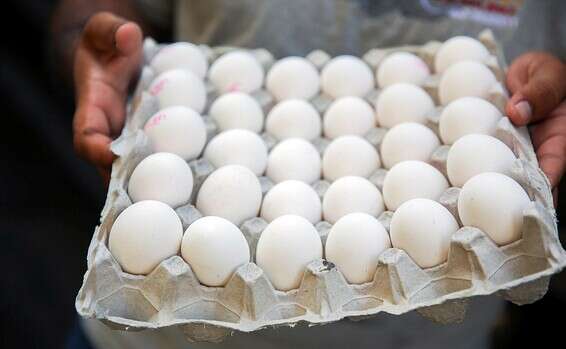The Ministry claims: "The Ministry of Agriculture distributes the quotas according to the previous winner" • On the other hand, the Ministry of Agriculture rejects the claims, but admits: The high price "is intended in particular to protect the families of farmers on the Lebanese border
Bad news for the consumer: despite the quotas - egg prices have not dropped
Photo:
Joshua Joseph
Egg prices in Israel are among the highest in the world, despite price controls - according to data from the international index "Numbao" to compare the cost of living in the world.
The Ministry of Finance is attacking the Ministry of Agriculture for the fact that despite the temporary lowering of tariffs on the occasion of Passover, egg prices are almost never falling, with most profits going to importers.
On the other hand, the Ministry of Agriculture claims that the removal of customs duties should not affect the price and justifies the planning regime to prevent "uncertainty in the growers' families".
According to the Numbao index, Israel is ranked seventh out of 106 countries in the world in terms of the price of an egg tray of 12 units (size XL) - with a price of $ 3.92 per tray.
In Sweden, by the same measure, an egg tray costs $ 3.52, in South Korea $ 2.83, in Germany and the United Kingdom - 2.74, in the United Arab Emirates - 2.59 and in Singapore - 2.35.
In the US, Americans enjoy an average price of $ 2.31 per tray of eggs - 40% less than the price Israelis pay. In Japan, Spain and Portugal the prices are even lower. Switzerland is the most expensive country, followed by Lebanon.
The high price of eggs in Israel stems from a "planned economy" throughout the entire production chain.
The OECD has been sharply criticizing Israel in recent years for its "market-distorted" planning method, which reduces competition and favors farmers over the general public.
The international organization called on Israel to replace planning with direct support to farmers, as needed.
In a recent Knesset debate, Eli Morgenstern, water and agriculture coordinator in the budget department at the Ministry of Finance, said, "If you want to continue planning, it means there will always be a shortage. Israel and Canada are the only countries where planning in the dairy and egg farms still takes place."
Not all previous wins
Recently, on the occasion of the approaching Passover, the Ministry of Agriculture approved the removal of tariffs on imports of 100 million eggs, to prevent shortages.
The usual customs duty on egg imports is 30 cents per egg, but surprisingly, the removal of customs duties does not lead to a decrease in the price to the consumer.
It should be noted that last Passover the eggs came from Ukraine, the Netherlands and Spain - countries where the price of eggs is significantly lower than in Israel (in Ukraine it is about 70% lower).
The Ministry of Finance claims that the stagnation in prices is due to the decision of the Ministry of Agriculture to distribute the import quotas using the "first come, first served" method, so that the profit is passed on to importers.
According to the Ministry of Finance, in the case of the import of 100 million eggs, this is a "gift" of about NIS 50 million to some large importers.
The Ministry of Agriculture said in response that "Eggs are a sensitive product, and to maintain public health, imports must meet veterinary requirements and come from approved countries. Not every importer can import. Even if the import price is higher, the price to the consumer does not increase accordingly.As for the price, the egg industry is a planned industry, with a short shelf life, and the price to the consumer is controlled.The abolition of the planning method may cause uncertainty among breeders in general and families on the Lebanese border. Employment is restricted. "
Finance: Despite quotas, egg prices are not falling
The Ministry claims: "The Ministry of Agriculture distributes the quotas according to the previous winner" √ On the other hand, the Ministry of Agriculture rejects the claims, but admits: The high price "is intended to protect farmers' families on the Lebanese border" Eyal Margolin - Ginny

